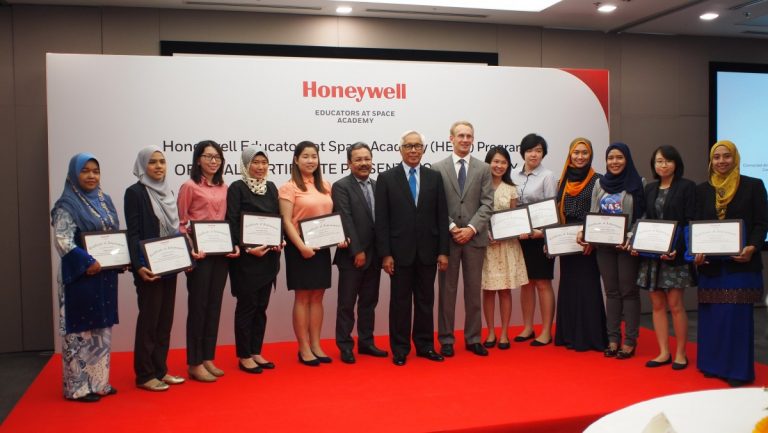
For one week, 15 Malaysians trained like they were going to be the next Neil Armstrong – simulating space missions, coding, survival training, learning flight dynamics – at a space academy in the United States.
There’s just one thing – they’re not budding astronauts.
They’re teachers.
In June 2016 and 2017, these educators joined their peers from all over the globe in a week-long programme at the US Space & Rocket Centre (USSRC) in Alabama, taking part in 45 hours of classes and instructions focused on science and space exploration.
The aim of the programme? To inspire teachers to reinvigorate their classrooms back home with more ideas, lessons and materials.
“In the classroom, teachers play a vital role in inspiring our youth to continue to pursue advances in science and engineering; in infrastructure and innovation; in education and environmental protection, and in science-based initiatives,” Honeywell Asean president Briand Greer said today at an event to recognise these teachers’ achievements.
Honeywell is the company behind this initiative with USSRC. Since its launch, 2,776 educators from 62 countries, including 25 from Malaysia, have graduated from the programme.
While Malaysia’s Science Adviser to the Prime Minister Prof Zakri Abdul Hamid at the event lauded the country’s investment in STEM education, Malaysian students still lag behind their global peers in mathematics and science proficiency.
In a 2015 study by the Organisation for Economic Co-operation and Development (OECD), Malaysian teens ranked 52nd out of 76 countries based on test scores in the two subjects. By contrast, its neighbour down south, Singapore, was at top place.
Zakri openly admits the country has yet to also achieve its 60:40 goal – the enrolment of 60 percent of science students and 40 percent of non-science students by 2020. The ratio is now around 40:60, despite the implementation of the policy since the 1970s through the National Science and Technology Enrolment Policy.
Analysts blame the country’s dismal performance in these rankings on failed education policies throughout the decades. Teachers in government schools are underpaid and bogged down with administrative work, while the profession struggles to attract talented graduates and lose many to the country’s “brain drain”.
Nonetheless, teachers Study International News spoke to at the event show not all is lost. Bright and enthusiastic, they talked easily of the ideas they are sharing with their students in their classrooms.

Saimma holding up her ‘astronaut suit’. Source: Lee Lian Kong
Saimma Ahmad, who has been teaching Science for almost a decade, regularly tells her students to see how their everyday world – from their clothing to their food – is based on science and its related fields.
“From what you cook to what you wear … STEM is the basis for everything,” Saimma told Study International News.
Saimma and the rest of her cohort paint an optimistic picture of Malaysia’s chance to climb up the rankings soon.
Looks like Zakri got it right when he said: “Inspiring students begins with inspiring teachers”.







